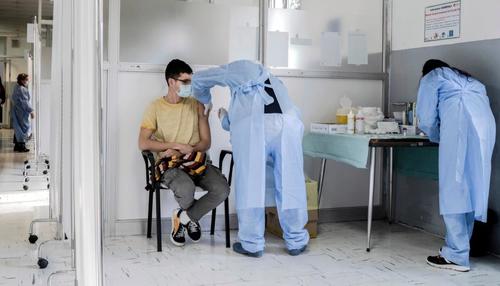Critical US Study Shows AstraZeneca Jab 79% Effective As Europeans Remain Skeptical
During a hastily organized official safety review last week, Emer Cooke, the head of the EMA, insisted that the benefits of the AstraZeneca vaccine far outweigh its risks. However, when it came time to address the 30 or so cases of sometimes-deadly rare blood clots that prompted dozens of countries to halt the jab, the scientist acknowledged that the cases were genuine, but that the agency “doesn’t have enough evidence to establish a definitive link.”
As it turns out, the review (which was followed the next day by a mirror WHO review that arrived at virtually all the same conclusions) has done little to bolster confidence in the jab across the Continent. According to Reuters, confidence in the jab has taken “a big hit” across Germany, France and Italy. After finding in late February that Europeans were more skeptical about the AstraZeneca vaccine than competitors from Pfizer and Moderna, YouGov polled 8K people in seven European countries between March 12 and March 18 (a period the coincided with the safety controversy) and found that in France, Germany, Spain and Italy, people were now more likely to see the AstraZeneca vaccine as unsafe than as safe. In France, 61% of respondents now say it’s unsafe. In Germany, that number is 55%.
But these polling numbers were overshadowed by an even more important AstraZeneca-related headline: results from a closely watched US trial have just been published. And they appear to confirm that the shot is both “safe” and highly effective. The study’s headline number showed the jab was 79% effective at preventing COVID, according to the trial data.
The trial, which was run by scientists from Columbia University and the University of Rochester in collaboration with AstraZeneca, showed the jab is particularly effective at protecting the elderly. Unlike earlier trials, around 20% of the volunteers in this trial were 65+ and the vaccine, administered as two doses, four weeks apart, provided as much protection for the elderly as it did for younger patients.
As one expert quoted in the BBC pointed out, the data should clear the way for the AZ jab to be approved in the US within a month or two, despite this mishugas with the blood clots.
32,449 participants were spread across trial sites in the US, Peru and Chile. Two-thirds of the participants got the jab, while one-third got a placebo. Amazingly, none of the participants who received the vaccine developed severe cases of the virus, and none were hospitalized. In total, the trial saw 141 cases among all trial participants, but it’s not clear how many patients from the placebo group were severely infected or hospitalized.
Notably, scientists specifically looked through the participant data to see if any cases of cerebral venous sinus thrombosis (blood clots in the brain that can result in dangerous bleeding) had emerged. They said they found none.
The jab has already been approved for use in some 70 countries, and thousands of jabs are being given in the UK every day. But the NYT said that being approved by the FDA would help revive the jab’s credibility.
In an interview Monday morning, AstraZeneca President Ruud Dobber took to CNBC’s “Squawk Box” to tout the trial’s safety data, while announcing that AZ intends to file for FDA approval during the first half of April, potentially leading to approval even more quickly than the company had let on.
“It was very pleasing to see that even with a magnifying glass the Data Safety Monitoring Board didn’t see any imbalance between the vaccinated group and the placebo group so that gives us a lot of confidence,” says @AstraZenecaUS President Ruud Dobber on $AZN vaccine in Europe. pic.twitter.com/WSaTXtZO4M
— Squawk Box (@SquawkCNBC) March 22, 2021
Furthermore, AZ touted the vaccine’s “overall safety profile” in its press release announcing the trial data.
The company’s shares climbed 1.8% during European trade on the news.
Tyler Durden
Mon, 03/22/2021 – 07:08
via ZeroHedge News https://ift.tt/3f3DJj1 Tyler Durden
